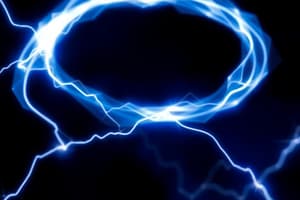Podcast
Questions and Answers
Which of the following statements about electric charge is true?
Which of the following statements about electric charge is true?
- There is only one type of electric charge.
- Unlike charges repel each other.
- The concept of electric charge arises from observations of nature. (correct)
- Like charges always attract each other.
What is the relationship between the electric field strength and the amount of charge present?
What is the relationship between the electric field strength and the amount of charge present?
- The electric field strength is directly proportional to the amount of charge present. (correct)
- The electric field strength is inversely proportional to the amount of charge present.
- The electric field strength is independent of the amount of charge present.
- The electric field strength is proportional to the square of the amount of charge present.
Which of the following statements about Coulomb's Law is correct?
Which of the following statements about Coulomb's Law is correct?
- It states that the force between charged bodies increases with the square of the distance between them.
- It is used to describe the interaction between gravitational forces.
- It states that the force between charged bodies decreases with the inverse square of the distance between them. (correct)
- It describes the interaction between electrically charged particles and magnetic fields.
What is the purpose of electric field lines?
What is the purpose of electric field lines?
What is Gauss's Law related to in electrostatics?
What is Gauss's Law related to in electrostatics?
According to Coulomb's Law, the electrostatic force between two point charges is inversely proportional to:
According to Coulomb's Law, the electrostatic force between two point charges is inversely proportional to:
The electric potential at a point is defined as the work required to move a unit positive charge from:
The electric potential at a point is defined as the work required to move a unit positive charge from:
Gauss's Law relates the total electric charge enclosed by a closed surface to:
Gauss's Law relates the total electric charge enclosed by a closed surface to:
The electric field strength E at a point is related to the electric potential V by the equation:
The electric field strength E at a point is related to the electric potential V by the equation:
In the equation for Coulomb's Law, F = k * (q1 * q2 / r^2), the constant k depends on:
In the equation for Coulomb's Law, F = k * (q1 * q2 / r^2), the constant k depends on:
Flashcards are hidden until you start studying
Study Notes
Introduction
Electrostatics is the branch of physics concerned with the electric field in conditions where its behavior is independent of magnetic fields. It involves the study of electric charges and their interactions with each other through the electric field. This article aims to provide an overview of various aspects of electrostatics, including electric charge, electric field, Coulomb's Law, electric potential, and Gauss's Law.
Electric Charge
Electric charge refers to the property of objects that gives rise to observed forces between them. Unlike gravity, there are two types of electric charges: positive and negative. Unlike charges attract each other, while like charges repel one another. The concept of charge arises from observations of nature and is described by Coulomb's Law, which states that the force between charged bodies decreases with the inverse square of the distance between them.
Electric Field
The electric field is a vector quantity that describes the force exerted on a unit positive test charge by other charges. It can be represented as a function of position and is often visualized using electric field lines, which point from negative to positive charges. The electric field strength is directly proportional to the amount of charge present and inversely proportional to the distance squared between the charged objects.
Coulomb's Law
Coulomb's Law is a fundamental equation used to describe the interaction between electrically charged particles. It states that the magnitude of the electrostatic force F between two point charges q1 and q2 separated by a distance r is given by F = k * (q1 * q2 / r^2), where k is a constant and depends on the medium in which the charges are placed. Coulomb's Law provides a theoretical framework for understanding the behavior of electric charges and their interactions.
Electric Potential
The electric potential V is a scalar quantity that measures the maximum reversible work that can be done by a unit positive charge placed at a specific location in an electric field. It is related to the electric field strength E via the equation V = -Ed, where d is the displacement of a test charge due to the electric field. The electric potential is an important parameter for understanding the behavior of electric fields and their effects on charged particles.
Gauss's Law
Gauss's Law is a mathematical statement concerning the distribution of electric charge within a closed surface. It relates the total electric charge enclosed by a closed surface to the flux of the electric field through that surface. In integral form, Gauss's Law states that the sum of the partial derivatives of the electric potential V with respect to each spatial coordinate over any closed loop is equal to the product of the permittivity ε0 of free space and the total electric charge Q enclosed by the loop divided by the area A of the loop. This law provides a powerful tool for analyzing the distribution of electric charge in various systems.
Studying That Suits You
Use AI to generate personalized quizzes and flashcards to suit your learning preferences.




